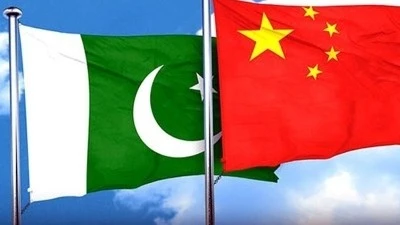- cross-posted to:
- china@sopuli.xyz
- news@beehaw.org
- cross-posted to:
- china@sopuli.xyz
- news@beehaw.org
Pakistan is once again engulfed in a summer of protests, facing significant social upheaval with ongoing anti-state demonstrations in many areas […]
The state’s response to the current unrest combines longstanding repressive tactics with new approaches [that seem to be] heavily influenced by its subservient and dependent relationship with Beijing. The Pakistani security agencies have adopted new repressive methods to suppress domestic dissent, especially in Balochistan and KPK, areas where Pakistan has upheld a quasi-imperial political structure since the mid-20th century […]
Pakistan’s tactics closely resemble China’s longstanding approach to suppressing social unrest, political resistance, and minority groups. Beijing is a symbol of extending authoritarianism into the digital realm through mechanisms such as the ‘Great Firewall’ and the ‘Great Digital Wall of China’.
The Chinese government has created one of the most restrictive media environments worldwide, implementing stringent censorship “to control information in the news, online, and on social media”.
Additionally, it has established numerous concentration camps in Xinjiang for the ethno-religious Uyghur Muslim minority. These camps, termed “re-education camps” by the state, hold millions of Uyghurs.
The Chinese government also compels Uyghur women to marry Han Chinese men as part of its effort to suppress this ethnically and religiously distinct minority, which it views as a challenge to its homogenization agenda.
Similarly, cultural assimilation tactics have been employed against Tibetan Buddhists to integrate them into the dominant Han Chinese culture.
Drawing from China’s methods to suppress minorities and stifle political dissent, Pakistan’s military-dominated establishment […] has recently sanctioned the creation of a national digital firewall.
This firewall, sourced from China, effectively grants the Pakistani state the authority to regulate social media platforms and restrict citizen access to crucial socio-political sites like Facebook, Instagram, YouTube, and TikTok [which] allows government agencies to trace individual IP addresses, which Pakistani officials label as primary sources of ongoing “anti-state propaganda” […]
In addition to implementing a nationwide digital firewall, the Pakistani government has also pledged to regulate the use of virtual private networks (VPNs) within the country […]
This scenario highlights how Pakistan is adopting the repressive tactics of the Chinese state, using them to target Baloch and Pashtun communities, and rendering their struggle invisible while continuing to suppress their calls for an end to ongoing state abuses.


